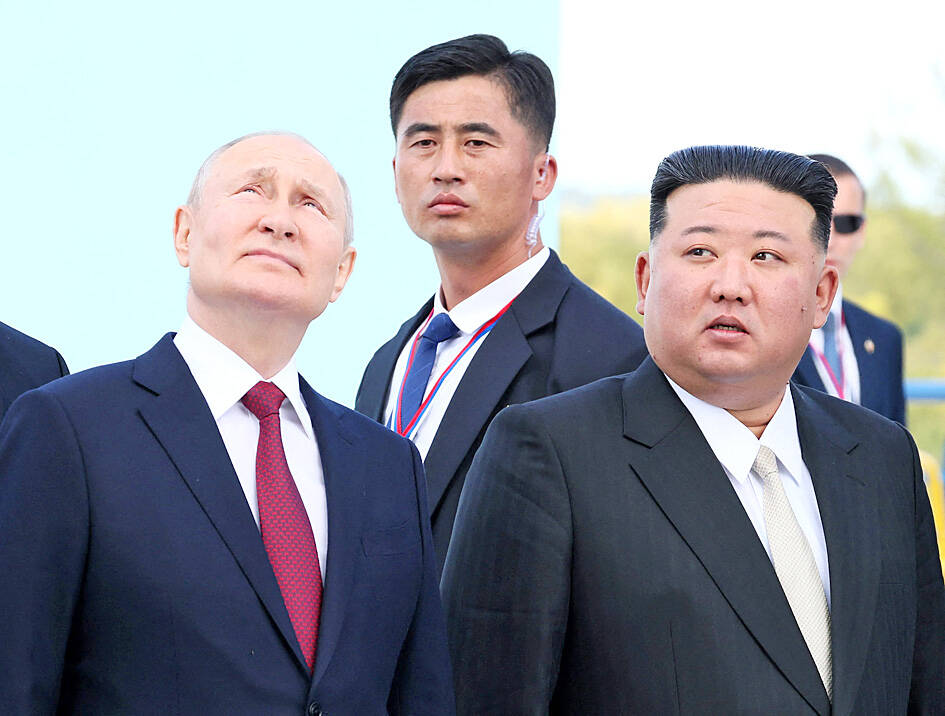North Korean leader Kim Jong-un and Russian President Vladimir Putin yesterday met for their first summit in four years, which the US said could focus on weapons deals that help the Kremlin’s assault on Ukraine.
Putin and Kim held talks at the Vostochny Cosmodrome in the Amur region. They shared a handshake when Kim stepped out of his limousine and then toured the space center, visiting exhibitions on Angara rockets, a family of launch vehicles.
The visit to the facility underscored some of the items that might be on Kim’s wish list in exchange for supplying munitions to Russia. Pyongyang has failed twice this year to deploy a spy satellite and might be seeking assistance from Moscow in putting one into orbit. Kim could also be seeking technology that would help his regime’s nuclear warheads survive the heat from re-entry to the atmosphere.

Photo: Kremlin via Reuters
Putin said North Korea was interested in Russian space rockets, and his country would potentially be willing to help it build satellites, Russian state-owned news outlet RIA Novosti said.
Kim would visit civilian and military equipment factories in Komsomolsk-on-Amur and also head to Vladivostok, Putin said.
When asked before the summit whether he and Kim would discuss military-technical cooperation, Putin said: “We will talk about all issues, without hurry. There is time,” RIA reported.
Russian news agency Interfax said Russia and North Korea agreed to cooperate in sectors including military.
North Korea has backed Moscow during its invasion of Ukraine and Kim used the meeting to offer his personal support to Putin.
“I would like to take this opportunity to reiterate that we have always expressed our full and unconditional support for everything that the Russian government is doing to defend its sovereign rights and its security interests in the face of such regional hegemonic forces,” Kim said in comments broadcast on TV from the meeting.
Shortly before the summit, North Korea put on a display of force, firing two short-range ballistic missiles into waters off its east coast, South Korea’s military said.
Kim might be looking for food aid and technology to support his plans to deploy a nuclear-powered submarine as well as help with his space program. Spy satellites could help Kim keep track of US forces in the region and better refine his targeting of potential strike sites, experts have said.
North Korea has some of the world’s largest supplies of munitions that are interoperable with Soviet-era systems, which Russia needs as it burns through its stocks of artillery shells. The US has said any supplies would not alter the course of the war and has told Pyongyang it would pay a price for any arms transfers.
North Korea has been busy churning out short-range ballistic missiles similar to some of the rockets Russia has used on Ukraine and which now appear to be in short supply. A transfer would mark a major elevation in cooperation, and the rockets would probably be sold at a high mark-up by Kim.

The CIA has a message for Chinese government officials worried about their place in Chinese President Xi Jinping’s (習近平) government: Come work with us. The agency released two Mandarin-language videos on social media on Thursday inviting disgruntled officials to contact the CIA. The recruitment videos posted on YouTube and X racked up more than 5 million views combined in their first day. The outreach comes as CIA Director John Ratcliffe has vowed to boost the agency’s use of intelligence from human sources and its focus on China, which has recently targeted US officials with its own espionage operations. The videos are “aimed at

STEADFAST FRIEND: The bills encourage increased Taiwan-US engagement and address China’s distortion of UN Resolution 2758 to isolate Taiwan internationally The Presidential Office yesterday thanked the US House of Representatives for unanimously passing two Taiwan-related bills highlighting its solid support for Taiwan’s democracy and global participation, and for deepening bilateral relations. One of the bills, the Taiwan Assurance Implementation Act, requires the US Department of State to periodically review its guidelines for engagement with Taiwan, and report to the US Congress on the guidelines and plans to lift self-imposed limitations on US-Taiwan engagement. The other bill is the Taiwan International Solidarity Act, which clarifies that UN Resolution 2758 does not address the issue of the representation of Taiwan or its people in

US Indo-Pacific Commander Admiral Samuel Paparo on Friday expressed concern over the rate at which China is diversifying its military exercises, the Financial Times (FT) reported on Saturday. “The rates of change on the depth and breadth of their exercises is the one non-linear effect that I’ve seen in the last year that wakes me up at night or keeps me up at night,” Paparo was quoted by FT as saying while attending the annual Sedona Forum at the McCain Institute in Arizona. Paparo also expressed concern over the speed with which China was expanding its military. While the US

SHIFT: Taiwan’s better-than-expected first-quarter GDP and signs of weakness in the US have driven global capital back to emerging markets, the central bank head said The central bank yesterday blamed market speculation for the steep rise in the local currency, and urged exporters and financial institutions to stay calm and stop panic sell-offs to avoid hurting their own profitability. The nation’s top monetary policymaker said that it would step in, if necessary, to maintain order and stability in the foreign exchange market. The remarks came as the NT dollar yesterday closed up NT$0.919 to NT$30.145 against the US dollar in Taipei trading, after rising as high as NT$29.59 in intraday trading. The local currency has surged 5.85 percent against the greenback over the past two sessions, central